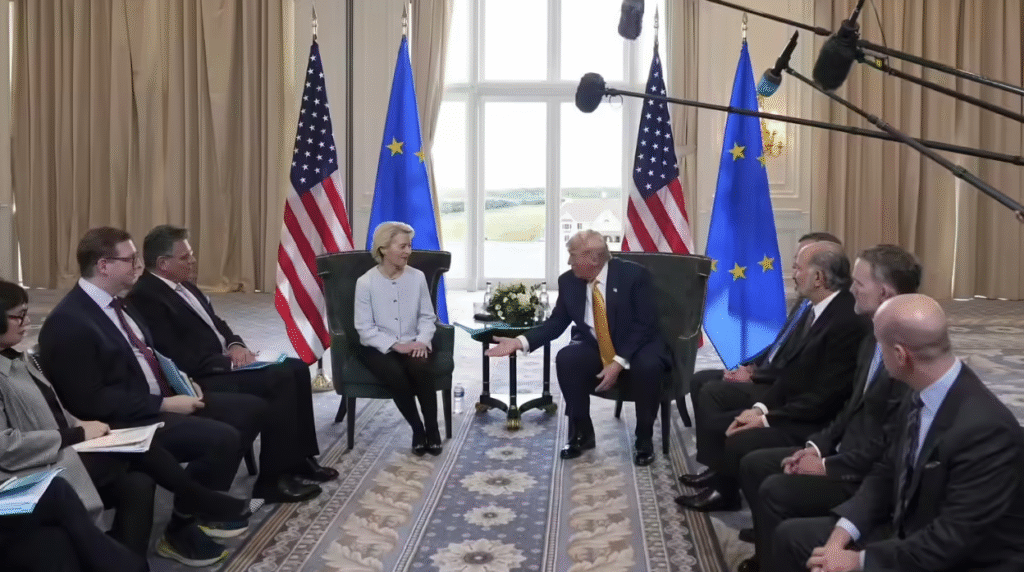U.S. Warns Europe Against Transatlantic Flight Restrictions
Air travel between the United States and Europe is one of the busiest in the world. Millions of passengers fly across the Atlantic every year for business, tourism, and family visits. Recently, the U.S. Transportation Secretary issued a strong warning to European nations about possible restrictions on transatlantic flights. According to the U.S., such unilateral measures could break existing international aviation agreements and create serious tension between both sides.
What Sparked the Warning?
The warning comes after discussions in Europe about adding new rules or restrictions on long-haul flights. Some European officials and policymakers have been exploring stricter measures to address environmental concerns and reduce emissions. While climate action is a priority, the U.S. believes these restrictions should not be imposed without proper consultation and coordination.
Importance of Transatlantic Flights
Flights between the U.S. and Europe are more than just travel connections. They are the backbone of global trade, tourism, and diplomacy.
-
Economic Value: The transatlantic aviation market supports billions of dollars in revenue each year. Airlines, airports, hotels, and tourism industries depend on these routes.
-
Cultural Ties: Millions of people travel to visit relatives, attend universities, or take part in cultural exchanges.
-
Business Links: Global companies rely on these flights for face-to-face meetings, trade deals, and investment opportunities.
Any sudden restrictions could harm these vital connections.
International Aviation Agreements
The U.S. and Europe are bound by open skies agreements, which allow airlines to operate freely between both regions. These agreements were designed to promote competition, lower ticket prices, and increase passenger choices.
The U.S. Transportation Secretary stressed that if Europe imposes restrictions without consultation, it could violate the spirit and letter of these agreements. Such a move might lead to disputes, legal battles, or even retaliatory measures.
Environmental Concerns and Aviation
One of the main reasons behind Europe’s consideration of restrictions is the rising concern about aviation emissions. Air travel is responsible for a significant share of global carbon dioxide output, and European leaders have been looking for ways to curb its impact.
Some proposals include:
-
Limiting the number of long-haul flights.
-
Introducing higher taxes on airlines.
-
Pushing for faster adoption of sustainable aviation fuels.
While the U.S. acknowledges the importance of climate action, it argues that unilateral restrictions are not the right solution. Instead, both regions should work together to find balanced approaches that protect the environment without damaging international travel and trade.
Possible Consequences of Restrictions
If Europe moves ahead with restrictions on transatlantic flights, several consequences could follow:
-
Higher Airfares: Fewer flights and more taxes could make tickets more expensive.
-
Reduced Connectivity: Passengers may find fewer options for direct routes.
-
Economic Impact: Tourism, hospitality, and trade industries could face losses.
-
Political Strain: Tensions between the U.S. and European Union could rise, leading to disputes beyond aviation.
U.S. Call for Cooperation
The U.S. Transportation Secretary emphasized that cooperation is the only way forward. Both sides should work through international bodies such as the International Civil Aviation Organization (ICAO) to set fair and effective environmental standards.
Joint efforts could include:
-
Investment in cleaner technologies.
-
Expansion of sustainable fuel research.
-
Improving air traffic management systems to cut emissions.
This approach would allow progress on climate goals while maintaining the strength of the transatlantic relationship.
European Perspective
On the European side, officials have been under pressure from environmental groups and citizens to take stronger action on climate change. With the European Green Deal and other climate initiatives, the EU has set ambitious targets for emission reduction. Aviation, being a high-emission industry, is under special focus.
However, some European airlines and tourism businesses also fear that strict restrictions could backfire. They worry about losing competitiveness, especially if U.S. airlines continue to operate without similar limits.
The Bigger Picture
The debate is not just about flights—it is about the future of global cooperation. Climate change requires joint solutions, and aviation is one of the industries where international teamwork is essential.
If the U.S. and Europe fail to find common ground, it could set a dangerous example for other regions. Instead of collaboration, countries may start imposing individual restrictions, leading to confusion, trade disputes, and disruptions in global travel.
Conclusion
The U.S. warning to Europe about transatlantic flight restrictions highlights the delicate balance between climate action and international cooperation. While Europe seeks stronger measures to reduce aviation emissions, the U.S. insists that unilateral restrictions would harm agreements and economic ties.
Both sides share a common goal: a cleaner and more sustainable future. However, reaching that goal will require dialogue, compromise, and innovative solutions. The outcome of this debate will not only shape transatlantic travel but also set the tone for how the world tackles climate challenges in the aviation industry.


